What better way to bring us back to the roots of this blog than a guest post on a foreign land? Pour yourself a cup ‘o and get comfy; we’re going to Wales.
Here to guide us is Ruth Livingstone, a retired doctor from England and a long-distance hiker, currently walking around the coast of Great Britain in very slow stages.
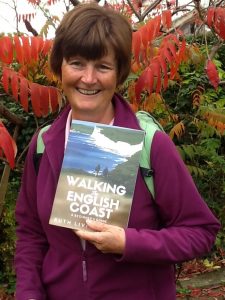
Walking the English Coast is not available as an ebook, so Ruth has offered a copy of Soggy Socks, a booklet that describes a rainy-day walk in Cornwall, as a give-away to one of our commenters.
NOTE to my American readers: You might notice a few places where the spelling or the syntax is “unexpected.” I’ve had a delightful time noting these distinctive Britishisms, remembering how I too quickly judged them when I lived and taught in Kazakhstan. How many will you find?
Welcome to And So It Goes, Ruth. Take it away.
Things I learnt about Wales.
You may have heard of Wales. It’s a lump of land—8,000 square miles of mountains and valleys— stuck onto the west side of England, some way below Scotland and a stone’s throw across the sea from Ireland.
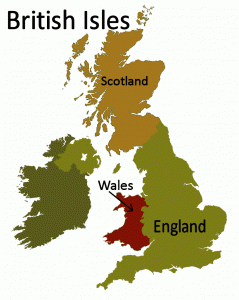
The Welsh are fiercely proud of being Welsh. If you live outside of Britain, you might be forgiven for thinking that Wales is simply another English county with a strong sense of local identity, like Cornwall or Yorkshire. In fact, Wales isn’t a county and it isn’t actually part of England at all. It’s a separate country.
I’m English and live in England, and I always thought of Wales as being a rather backward and uncivilized part of the British Isles. Yes, I made some assumptions about Wales, partly based on the notion that if someone lives reasonably close to me, they must share the same heritage and beliefs, and in part, perhaps, due to an unconscious refusal to accept that Wales really is a different country to England.
Things I thought I knew about Wales.
- The Welsh don’t like the English
- They sing, very well. (Tom Jones is Welsh).
- They play rugby football. Also very well.
- They sometimes speak a different language.
- And… hmm… well, that’s really all I knew about Wales.
That was before I set out on my long distance hike, and ended up walking 1,000 miles around the Welsh coast. During that trip I got to know the real Wales and discovered it is a most confusing, perplexing, irritating, contradictory, and thoroughly wonderful country.
Things I discovered about Wales
- It’s true. The Welsh really don’t like the English. But their antipathy shouldn’t be taken personally. After centuries of being invaded – by the Saxons, the Danes, the Romans, the Normans, and then by rich English people snapping up cheap holiday homes – the Welsh can be forgiven for disliking outsiders.
- Wales is economically deprived, and things have gotten worse since the mines closed and the manufacturing industry packed up. For this reason, things usually cost less in Wales. Eating out, for example, is certainly cheaper than in most of England and much cheaper than London prices. Welsh food is, however, not particularly exciting, with a few exceptions which I will mention below…
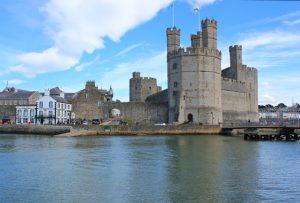
- When in Wales you MUST sample Welsh cakes, which aren’t cakes but delicious flat scones. And you must also try Bara Brith, which is described as a type of ‘bread’ but in reality is a wonderful fruit cake. Once, feeling brave, I had a go at eating Laverbread, which is also not a bread at all, but a dark-green seaweed paste, and tastes much nicer than it sounds.
- In South Wales, they speak English. If they start speaking Welsh in your presence, they’re just being rude. In North Wales, they speak Welsh. If they start speaking English in your presence, they are just being polite.
- There are a great many sheep in Wales, and they outnumber human beings by three to one. But, despite being everywhere, you are unlikely to find a decent plate of lamb in Wales, because most of their meat is exported. The exception is a delicious Welsh dish called Welsh Cawl. This will be advertised on the menu as soup. It’s not soup. It’s a lamb stew you eat with a spoon. (If you visit Wales and don’t eat Welsh Cawl you will be missing a great treat.)
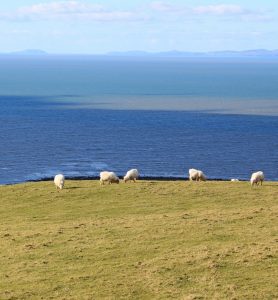
- I spent time poking about in small museums and talking to local people, and discovered everyone has a story to tell. In fact, the Welsh have a rich heritage of stories and folk tales. It’s a land of poets and writers, of dragons and giants, of kings and queens I’d previously never heard of. It even has its own group of saints.
- The most important thing I discovered about Wales is that the country is staggeringly beautiful. The south coast, to be fair, is somewhat overcrowded and industrialized, but the rest of the country is breathtakingly gorgeous. Wild mountains cover the inland, while the coastline stretches for nearly 900 miles with glorious beaches and dramatic cliffs.
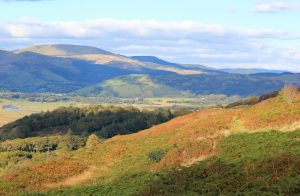
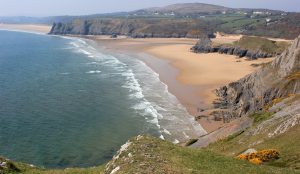
During the course of my long-distance hike, I followed the Wales Coast Path, which must be one of the most beautiful coastal paths in the world. It took me nearly 2 years to complete and was one of the best experiences of my life.
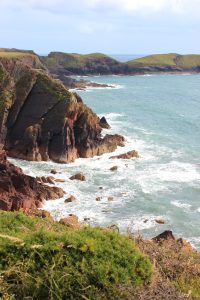
Having recently published a book on walking the English coast, my next project will be a book on hiking the Welsh coast. I can’t wait to share it with the world and encourage more visitors to this wonderful place. As for the Welsh… well, they’ll just have to put up with another wave of invaders.
***
When not out trekking, Ruth blogs, tweets and writes. Her book, Walking the English Coast: a Beginner’s Guide is available as an illustrated paperback from Amazon: myBook.to/WalkingEnglishCoast
Here is Chapter One of Walking the English Coast, to whet your appetite.
[learn_more caption=”Chapter One: Why I Walk”]My mother loved walking and her walks were part of her daily routine, along with afternoon naps and a morning cup of tea. But, when I was younger, I thought my mother was crazy because I just didn’t see the point in doing all that walking. ‘If humans were meant to walk everywhere, we wouldn’t have invented the motorcar,’ I told her.
‘Anywhere is walking distance, if you’ve got the time,’ says Steven Wright, the American comedian. But if you are a busy person, the one thing you haven’t got is time. There are so many other things to do.
Life passes by, and at a faster and faster speed as you get older. By the time I reached my 50s, I was well-established in my career, working as a GP in partnership with my husband within the NHS, and we had a happy family life. I was experienced and confident at work, and had reached that point of competence where nothing seemed a challenge any more. In fact, every day seemed much the same – mundane, routine – rather boring in fact. I had the strong sense of time slipping past, of my life slipping away.
I decided I needed a real challenge. An epic challenge.
In my daydreams, I thought of climbing Kilimanjaro, or taking long train journeys across Asia, or backpacking through the Himalayas – but none of these madcap ideas seemed to fit in with my professional commitments as a busy doctor, not to mention my domestic commitments with a husband, three teenage daughters, and a couple of aged parents. It’s a sign of my desperation that I even considered training to run marathons. ‘Are you crazy?’ my husband said. ‘You hate running.’
He was right. I do.
Then, little by little, a plan began to form. I realised I wasn’t going to become a triathlete, swim the Channel, or take up rock climbing. But anybody with two working legs can walk, can’t they? You just put one foot in front of the other and keep going, and keep going, and keep going.
Walking. Yes. I could go walking.
The more I thought about it, the more attractive it seemed. But I wasn’t going to go on aimless rambles, the sort I had hated going on as a child. No, a pointless ramble is… well, it’s pointless. I needed a purpose to my walking, a challenge with an ultimate goal. But a trek that thousands of others had done before me didn’t appeal either, so that ruled out popular routes such as The Pennine Way or Land’s End to John O’Groats. I wanted to do something different. If not unique, at least something that was unusual.
We prefer to create stories to explain our decisions, rather than admit they are entirely irrational and arbitrary. And so I might tell you how I was born in a hospital overlooking the ocean, or how I love the sea because it connects the earth with the sky and makes me feel close to the mysteries of the universe. I might explain that I now live in the centre of the country, far from the shore, and miss the tang of salt, the heave of the waves, and the vast, empty seascapes of the coast.
But the truth is this: I can’t remember exactly why I stumbled on the idea of walking around the coast.
In 1986, a lady called Helen Krasner set off to walk the entire coast of mainland Britain. She had the added advantage of being a writer, as well as a walker and, after she finished her walk, she sat down and wrote a book about her exploits, entitled Midges, Maps and Muesli. ‘I invented dozens of reasons for the walk for the benefit of reporters and TV interviewers,’ Helen explains, before going on to say she wanted to walk around Britain simply because ‘it seemed like a nice thing to do’.
Once the idea had formed, I started researching.
Britain is full of walkers. We’re obsessed with walking, which is commonly cited as one of our favourite national pastimes. We talk about it, write about it, and blog about it. We go for rambles in our National Parks and follow the long-distance trails that crisscross our countryside. We tramp over moors and bag Munros. We walk through forests, fields and peat bogs. Thousands of us have marched from Land’s End to John O’Groats. Yes, we go walking everywhere.
‘Walking the coast,’ I typed into Google, thinking surely everybody was doing it, because nobody in England lives more than 75 miles from the coast. And I discovered something startling: very few people have actually walked around the entire British coastline. In fact, more people have climbed to the summit of Everest (7,000, according to Wikipedia) than have walked around the coast of Britain (possibly around 50, according to David Cotton’s website). Which seemed astonishing.
Immediately, I knew this was it. Walking around the coast was both unusual and a challenge, but it involved only one skill, and that skill was something I already possessed – the ability to put one foot in front of another.
Walking the coast. It was well within my capabilities and exactly the right thing to do.
My mother-in-law became suspicious of my new obsession. She reminded me: ‘You can go to faraway places, but no matter how far you travel, you can never leave yourself behind.’ In a way, she was right. In a way, she was wrong. Yes, you can never leave yourself behind. But walking will change you. It has changed me. It has turned me into a more thoughtful person, a more rounded person, and has made me aware of the great beauty and fragility of the wonderful country I live in. So, you see, I really have left myself behind. The old me.
I was 54 years old when I set off to walk the section of coastline within easiest reach of my home, which happened to be the Norfolk Coast Path. My husband thought I was suffering from a temporary, and possibly menopause-related, insanity and would soon give up. But I didn’t, and when I reached the end of Norfolk, I kept on going.
Six years later, with over three thousand miles beneath my feet, I’m still walking. And I’ve never looked back.
Your reasons for walking will be different from mine. And your ambition may be very different too. You might want to walk in order to get fitter, or slimmer, or for companionship, or to find happiness. You might be contemplating a very long, continuous walk, or you might be thinking of a series of short walks around sections of the coastline.
Whatever reason you have for walking and whatever type of walk you decide to do, remember, it’s your walk. Only you can walk it. TOP TIP: It might be a good idea, at this point, to grab a piece of paper and just jot down a few reasons why you want to walk the coast. And then, read on… you’ll probably think of some more to add to your list in a moment. ~ ~ ~ [/learn_more]
Again, that link for her print book, Walking the English Coast: a Beginner’s Guide, available as an illustrated paperback from Amazon: myBook.to/WalkingEnglishCoast
Ruth’s other social media links are:
www.coastalwalker.co.uk
www.facebook.com/RuthLivingstoneWriter
@RuthlessTweets
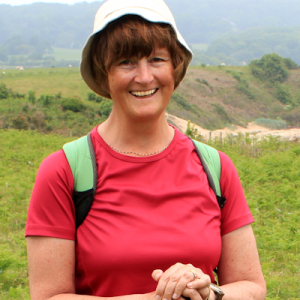
Keep in mind she lives on Greenwich Mean (London) Time. Still, Ruth has promised to pop in here once a day for the next few days and answer any questions we might have. I can think of a slew.
How about you? What comes to mind as you read of Ruth’s travels in and observations of Wales?
[box] Interested in reading At Home on the Kazakh Steppe? I hope so.Click here for the PAPERBACK and eBook versions.
Amazon makes it easy. And, you can always order it from your local independent bookstore.
If you’ve read it, and enjoyed it, a review on Amazon would be much appreciated. [/box]
Merril Smith
Thanks to you both for sharing Ruth’s journey. The photos, like others I’ve seen, show how beautiful Wales is.
As you know, Janet, there are many Welsh place names in the Philadelphia area from the Welsh Quakers who settled here in the “Welsh Tract,” under William Penn. Welsh miners also settled later in the area around Scranton, PA. I first heard of “Welsh Cakes” from my husband’s family, who lived in Scranton. They call them Welsh Cookies. They are cooked on a griddle or frying pan. They are my husband’s favorite cookies.
Janet Givens
I hadn’t thought about the Welsh connection to Philadelphia, Merril. Thanks, though I’m aware of the Scranton connection. As for Welsh Cakes, you refer to them as cookies and Ruth calls them scones. Could you share a recipe with us? They sound fantastic, whichever one they are.
Janet Givens
Thank you so much for visiting with us, Ruth, and sharing your thoughts and discoveries while walking the coast of Wales. What an intriguing goal to set.
Of course, my curiosity it piqued around the differences you met along the way. I recall being entertained when I was in Denmark and Sweden by hearing their respective stereotypes of each other. Danes think Swedes are a stuffy and too straight-laced; Swedes think Danes party too much. And, when I checked that out, both groups agreed (and laughed). So, I’m wondering what (good-natured) stereotypes do you think the Welsh hold about the English and vice versa?
Merril Smith
I included the recipe in this old post.
https://merrildsmith.wordpress.com/2013/11/27/mixing-and-stirring-blending-food-family-and-friend/
Janet Givens
Thanks. I got it.
Ruth Livingstone
hi Merril. Yes, Wales is a very beautiful country. Reading your comment it strikes me we have the same language, but our words might not necessarily mean the same thing! So, in England we would call Welsh cakes ‘drop scones’ – cooked by literally dropping the mixture onto a griddle. Cookies is not an English term, although it is creeping into our vocabulary. Traditionally we eat biscuits, which are usually crisper and thinner than the American cookie. Welsh cakes are definitely not biscuits, although I can see how they might be called cookies. See how confusing our language can be? ?
Janet Givens
Too bad we can’t have a sampling here, Ruth. I’m wondering about the sweetness in the various confections. Scone and biscuit here in the U.S. are not as sweet as a cookie (which is always sweet, here). In the recipe Merril posted, there was 1 cup of sugar to 5 cups of flour. So, that doesn’t seem as sweet to me as say an oatmeal raisin cookie. I thought I’d bring the fixings for this and make a batch when I meet up with my g’kids for a ski trip. Do you have a recipe for these “cakes” too? I’d love to compare.
Ruth Livingstone
You’re right about the sweetness. Welsh cakes are not as sweet as cookies, and not even as sweet as cake. You usually eat them warm and with butter – which melts deliciously – although they’re often served cold too. Don’t have any recipes I’m afraid. I’m a hopeless cook!
Merril Smith
Our Welsh cookies are eaten like, well, cookies, though they are not very sweet. You would not want to add more butter, I wouldn’t think to these.
Merril Smith
These are definitely not very sweet, and they are rolled, not dropped on the griddle. (Do not grease the griddle or fry pan, or they will be very greasy.) They are like a cross between a scone and a cookie–very nice with coffee or tea.
Janet, the original recipe that I got from Doug’s grandmother used lard and butter or margarine.
Janet Givens
Yummy. I’ll get lard from my local butcher. Free range Angus beef = great lard. Or is it the pigs that lard comes from? Not my area.
Merril Smith
Lard comes from pigs. You can tell the recipe didn’t come from my family. I’ll stick with butter.
Kathleen Pooler
Thank you Janet and Ruth for taking us on this fascinating tour of Wales. The photos are breathtaking and I enjoyed learning about the people and place.
Janet Givens
Hi Kathy. Yes indeed. I had the same reaction; they are stunning.
And now I’m curious what kind of camera Ruth used to take them. Did you use your phone, Ruth? Or did you have a great camera? They strike me as “great camera” quality.
Ruth Livingstone
Hi Kathy and Janet. Yes, I use a DSLR camera. (It’s a Canon EOS 550D, if you want the technical details.) I’m afraid I’m a lazy photographer – just switch my camera to its landscape setting, and point and click! IPhone cameras are excellent for selfies and objects that are reasonably close, but not so good for landscapes.
Carolyn
It may be the alleged antipathy of the Welsh to the English is due to the Anglo-Saxon invaders who gave the Welsh their name in English language. Old English “welsch” means foreign or stranger. A lot of the antagonism is really just the British style of humour – after all, the Scots say in sport (as a big joke) : “I support Scotland or any other team playing England”.
Janet Givens
That’s really interesting, Carolyn. Funny on the sports story, too — we have similar boasts here. Usually at the college level, among alumni, old alumni.
Ruth Livingstone
Hi Carolyn. Yes, most of the rivalry is good natured. I do remember back in the 1970s there was a spate of arson attacks on English-owned holiday homes in Wales. Luckily that’s all history now.
Tim Fearnside
Thanks, Janet — and thank you, Ruth. A lovely article to take us away for a moment from all that’s going on here in the states, and to revive my own long-standing fantasy of tracing my ancestry through the British Isles (including Wales, thanks to my paternal great grandfather, Chauncey Powell, a true Welshman, from whom my middle name derives). And I concur with the others, above — ‘some very lovely photos :).
Janet Givens
Hi Tim. You and Woody could be related then. My paternal folks were further up “the hill.” But I too hope to get back there someday and do a little digging.
Tim Fearnside
Perhaps I should have clarified — this was my dad’s mom’s dad, making me merely between 1/8 and 1/4 Welsh (to go along with a full quarter English (the proud county of Yorkshire), and roughly equal parts Irish and Scots. A true Imperial mutt. (Also that, mercifully, my middle name is “Powell,” not “Chauncey”). I’ve long envied Jeff, who biked extensively through the Isles on two separate journeys, many years back…
Janet Givens
Good clarification there, Tim. I was concerned for the Chauncey.
Tim Fearnside
Ha! – yes, well I didn’t want to cause any needless sympathy, lol
Ruth Livingstone
Hi Tim. What a wonderful name – Chauncey Powell. Love it. Tracing your ancestry is a very interesting thing to do, and you might even be descended from one of those Welsh kings ?
Tim Fearnside
Thanks, Ruth. Yes, “Chauncey Powell” certainly has a nice ring to it! Rumor has it, he was true to the old Welsh stereotype of being a notorious skinflint, having become a self-made millionaire through hard work and savage thrift, losing most of it during the ’29 market crash, then somehow, remarkably, recovering most of it while working as a manual laborer, shrewdly investing every spare penny. At least, those were the stories I heard as a child. As for any royal lineage, it’s certainly something to look into, as I’ve never traced the Powell branch, but would like to. Thanks for your kind response
Cathy Monaghan
WOW! Thank you SO much Janet and Ruth for this LOVELY break from the perils of the USA. I thoroughly enjoyed the above tour of Wales! I’ve been to Scotland and England, but didn’t make it to Wales nor Ireland … yet. I hope to be walking the same path in the next few years (before my aged legs give out on me). Ruth, I will be happily following you on Facebook. Cheerio.
Janet Givens
Hi Cathy. I’m glad you also appreciated the break. We all need that from time to time.
Your comment — and your plan to walk the same path — reminds me of another question I had for Ruth: how did the logistics work? For example, how many miles in one “stretch?” How many overnights along the way? How did you get from the finish line back home? Who did yo have to collect you?
When Ruth and I began talking about today’s post, we discussed the other British “walking book” — Free Country, by George Mahood — which we both had enjoyed. It had a little different premise (and they did it in one long trek) which was that they weren’t going to spend ANY money along the way. It made for some very entertaining stories. Ruth’s is a bit more serious (and therefore easier to adopt) but still those logistics must be something to figure out.
Ruth Livingstone
Good questions Janet. I go away for anywhere between 3-10 days at a time. Walk 10-15 miles each day (22 is my all time record, and I didn’t enjoy the last few!) I tend to stay in the same place for a few days at a time, either a cheap hotel, a pub with rooms, or a family owned B&B). Then I use a mixture of my car and public transport to get me to and from my start and end points. Sometimes my husband comes with me, not to walk but to provide the transportation. He goes road biking while I walk.
If I’ve used any obscure British terms above, just ask, and I will try to translate them!
Janet Givens
Not so far. You know I’ve always loved walking. I hike a lot here in the Green Mountains of Vermont, but those are always “round trip” hikes. I’ve actually never thought of hiking one way, like some do our Appalachian Trail, from start to finish. It’s intriguing. And I love that you don’t have to carry your bed on your back. That’s been something of a discouragment .
New question for you: (then I’ll leave you alone for a bit while I finish up another project) Did yo have to do any sort of training to get ready to do these long walks or was the 10-15 miles a day training enough? Have you read Wild? Another hike along a trail book (more or less).
Ruth Livingstone
Training? What’s that? ?
No, I didn’t do any training when I first started. Now I try to do some consistent walking in between my coastal expeditions, just to keep my legs moving. So, for example, over Xmas and New Year I tried to walk 3-5 miles a day around our local town, with one longer (10 mile) country walk at the weekend.
I enjoyed reading Wild, although the real narrative of Cheryl Strayed’s book is her back story, rather than the walk. Good book.
Ruth Livingstone
Hi Cathy, you will really enjoy walking the Wales Coast Path. Are you planning to do it all? Or just a section? Most people choose the Pembrokeshire coast path stretch, although the section just north of Pembrokeshire (the Ceredigion Coast Path) is equally beautiful. Once you get north of Pembrokeshire, you’re really in Welsh-speaking territory and won’t hear much English.
Cathy Monaghan
Hi Ruth, thanks for the info. I’ll have to study up on it before I make a decision. I think it will all depend if I am going to be walking with someone, or alone. I’m one of those who goes with “gut feelings” – if you know what I mean. I’m also one of those who likes to learn a new language along the way. I’m following you on Facebook and will be reading your blogs too! Thanks so much for being a writer and sharing your stories!! You too Janet!!
Susan Jackson
Reading this almost makes me want to rethink my next trip–Scotland. I love hiking but only hiked a small part of Wales when I lived in England. It was even cold in Summer (I am from Florida). I forget which area I was in but being on a coastal path with hills filled with lovely soft grass was amazing. Stop when you want, lay in the grass and watch the seals if you are lucky. I used to worry about slipping off the grass and crashing down the cliffs into the ocean!!
Ruth Livingstone
I’ve not reached Scotland yet, Susan. Still working my way up the west coast of England. I think Wales is less wild, has more places to eat, stay, etc. Certainly a place I want to return to.
Janet Givens
Well, I for one am very glad you didn’t slip off that grassy cliff. Ouch.
I’ll be eager to follow you on your trip to Scotland, for it’s a land I plan to tour one of these years.
Thanks for stopping by.
Ian Mathie
This is fun, but in reality Ruth has barely scratched the surface here. I spent four years at university in Wales and loved it. The people are warm and vibrant, with a pawky sense of good humour. Mostly good Chapel goers, they sing most gloriously, with choirs in every community producing everything from pop to classical opera with gusto and style. They work hard and play hard, and are tremendously loyal to family and friends with a spontaneous generosity that is a natural part of a strong community. They are also wonderful poets and bards who speak a language that sounds like Algebra, looks like it when written, and includes incredibly long words.
Do, do, do go to Wales. You won’t regret it.
P.S. I’m NOT being paid by the Welsh Tourist Board for this!
Ian Mathie
By the way, they have some superb beer in Wales, although in one or two places the pubs are closed on Sundays.
Janet Givens
Is Wales strongly religious? I’m wondering because when pubs are closed on Sundays here in the US, it’s generally because the local folk are strongly religious (or were and no one’s bothered to change the law). We call them “blue laws,” and they go back passed the Puritans to the time of Cromwell and his “blue-stocking” supporters. See, London is to blame.
Ruth Livingstone
Wales is strongly non-conformist, by which I mean non-Catholic and non-Church-of-England. Yes, Puritan influence, and strong Methodist influence, and Baptists too.
Janet Givens
I’m loving that “pawky sense of good humor” and the language that “sounds like Algebra,” Ian.
So, just how do these various characteristics identify the Welsh as “Welsh” and not “English.”
I didn’t know you studied in Wales. When’s that memoir coming out?
Ruth Livingstone
My nephew went to Uni in Wales. Aberystwyth. Beautiful, safe and friendly, although a long way away from anywhere else! And I agree, in a blog post you can’t really sum up a whole country. Also Wales is almost two countries: the southern half with its industries and predominantly English-speaking inhabitants, and the northern half, which is Welsh-speaking and more ‘foreign’.
Janet Givens
The “two countries” idea is one I’ve considered among many of our states here in the US. California, New Jersey come to mind most readily, with the southern portion being so very different culturally from the northern part. So I find it particularly fascinating that you noticed the same thing in Wales. Makes me wish I were back in grad school: I’d look further into it.
Joan Z. Rough
Thanks so much, Ruth and Janet for this delightful post and tour of Wales. I love learning about all of the distant places I haven’t been yet and Wales is one of those I’ve always wanted to visit. Happy Walking!
Janet Givens
Hi Joan. I know; doesn’t it sound delightful. I think I’m partial to the part of Ruth’s walk that involves those friendly B&Bs.
Ruth Livingstone
I’m not sure f you have B&Bs outside of the UK. They certainly a wonderful way to see the country AND get to know some interesting people.
Janet Givens
Oh yes indeed, Ruth. B&Bs dot our countryside just as they do yours. They used to be a rather inexpensive alternative to hotels, but have become more outre over the years. Do you find AirBnBs in Wales or England? That’s the new rage here — lets the home owner skip over the local zoning laws.
Ruth Livingstone
Yes, Air B&Bs have hit the UK too. I know people who’ve successfully booked through the site, but I prefer to stay with a proper B&B establishment.
Janet Givens
I’m happy to report that Susan Jackson has won the copy of “Soggy Socks: Walking in Wet Weather,” from Ruth Livingston. I trust it will bring back memories of long ago hikes in Wales (and perhaps encourage you to return?).
Susan, if you’ll email me at janet@janetgivens.com I’ll pass along the PDF pronto.
Congratulations.
Laurie Buchanan
How my gosh, how COOL is that?! I’ve added “Walking the English Coast” to my reading list, and just started following Ruth on Twitter.
Janet Givens
Excelllent, Laurie. I’ve been following Ruth on Facebook, which has been a delight. And, lord knows, we can all use opportunities for delight these days.
Janet Givens
Now that Laurie has popped in I can officially declare this particular post fini. Thank you again Ruth, for a lovely tour of the beautiful countryside of Wales and helping us learn a bit more about this land of Tom Jones.
Rest up everyone; tomorrow we’ll explore narcissistic personality disorder. Everything you’ve ever wanted to know …. and then some.
Gathering Strangers to My Home: A Cultural Perspective – Janet Givens
[…] the same generation (ah, that we did talk about — all of us in the broad category of “midlife“), […]